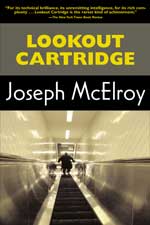

|
Lookout Cartridgeby Joseph McElroy Edition History:
|
|
This mystery set mainly in London and New York centers upon a film made by two Americans living in England, Dagger DiGorro and his friend Cartwright. Certain forces are threatened by the film, by Cartwright’s diary of its shooting, and by his inquiry into why it was apparently destroyed. His family in danger now as well, Cartwright revises his recollection of the actual scenes shot in the film, as bits from diary, memory, and film come together, hiding or revealing one another; and in the process he reconstructs for us not only the film but the rich and peculiar reality of his life abroad. Corsica, Wales, Stonehenge, a country house and its rainy patio where an umbrella shelters a deserted TV receiving Apollo 15 pictures from the moon — these scenes turn back upon Cartwright’s ambiguous relations with his wife, Lorna, who has at last managed to settle into English life, and with his son Will, an English schoolboy, and with Lorna’s best friend, the fascinating and difficult Tessa. His daughter Jenny, meanwhile, has become involved in the very network of forces the film threatens. Above all, we see Cartwright tramping the Outer Hebrides answering death with death, shadowed at Chartres, finding his perilous way over the map of New York City past and present; Cartwright alone and totally connected on the lookout for a sign from his people or a sound from his unknown enemy. A breathless rhythm of transatlantic flights drives the story through random and political violence. At the crux is Cartwright’s strangely increasing power — compounded of courage, luck, compulsiveness, and the sense that he has been inserted into a vast collaboration. What the Druid Andsworth has told him — about the human body, computer circuits, new forms of telepathic contact — combines with Cartwright’s technological imagination and survival instinct to carry his actions beyond pessimism and grotesque comedy, easy or tragic endings, to a series of haunting climaxes. One by one they bring us closer to this businessman, husband, father, filmmaker, visionary, and to truths vagrant and compelling about the suppositions to which we anchor our lives. |
|
Reviews for Lookout Cartridge |
|
|
George Stade New York Times Book Review Feb. 2, 1975, ... like the movie "Blow-Up," in that its hero thinks he sees with a camera what his naked eyes have refused to see ... and like many novels ... from Dostoevsky to Michel Butor in that its unexpected harmonies and novel dissonances sound against the conventions of the mystery novel. ..."We are in the grip of forces," says Cartwright, the hero whose mind is the "lookout cartridge" of the title, "and also of their absence." ... The systems of power -- financial, criminal, political, domestic, erotic, and psychotic -- that extend through and around [Cartwright] wheel at all angles to each other and at different speeds. And ... we know that they signal the main sources of anxious fascination and eerie power generated by this novel ... not ... easy to read ... or to put down ... For its technical brilliance, its unremitting intelligence, for the rich complexity of the homologies and analogies between its systems and the fearful times we live in, "Lookout Cartridge" is the rarest kind of achievement. |
|